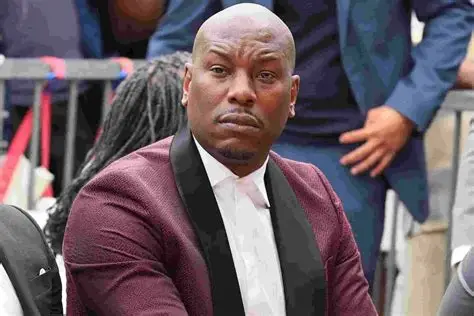Fast and Furious star Tyrese Gibson turned himself in to Atlanta police on Friday, October 3, 2025. The actor and R&B singer face a misdemeanor charge of animal cruelty. His four Cane Corso dogs allegedly killed a neighbor's beloved pet.
The 46 year old actor was booked just before 6 a.m. local time at Fulton County Jail in Georgia. He posted a $20,000 bond and was released the same day. But the legal drama is far from over.
Authorities want the four dogs involved in the attack. Tyrese has refused to turn them over. County officials say he's "still not cooperating" despite turning himself in.
This is a story about tragedy, responsibility, and the consequences of pet ownership gone wrong. And it's unfolding in one of Atlanta's most upscale neighborhoods.
The Tragic Night That Changed Everything
The incident occurred on September 18, 2025, in the upscale Buckhead community of Atlanta where Tyrese lives. His neighbor, Harrison Parker, let his 5 year old Cavalier King Charles spaniel named Henry outside to use the bathroom around 10 p.m.
Parker came back just five minutes later. What he found was every pet owner's worst nightmare.
Henry was lying in the driveway near the front door. He was covered in slobber. He had broken ribs, puncture wounds, and internal bleeding. The beloved family pet was dead.
Security footage told the horrifying story. Tyrese's four Cane Corso dogs had escaped from his property. They ran through the neighborhood. They attacked and killed Henry in his own driveway.
"He was probably one of the most wonderful dogs," Parker told FOX 5. "I know probably every animal owner says that, but he was incredible. He was so loving. He's a little mischievous. He loved to go outside."
Parker immediately called 911. The emotional weight of losing his companion of five years was clear in his voice.
What Are Cane Corsos?
Cane Corsos are large Italian mastiff dogs. They can weigh between 90 to 120 pounds. They were originally bred as guard dogs and hunting companions.
The breed is known for being protective and loyal to their owners. But they require extensive training, socialization, and responsible ownership. Without proper management, they can become dangerous.
Tyrese owned four of these powerful dogs. According to his statement, he acquired them because he felt he needed protection. He cited "stalkers randomly showing up at his home" as the reason for getting the breed.
But protection dogs require expert handling. And according to neighbors and police reports, Tyrese's dogs had been causing problems for months.
A Pattern of Problems
This wasn't the first time Tyrese's dogs had escaped. Not even close.
According to Fulton County Police Captain Nicole Dwyer, Gibson received a warning on September 7, 2025. His dogs had been seen running through the neighborhood more than five times over the past few months.
Robb Pitts, the chairman of the Board of Commissioners of Fulton County, Georgia, told ABC News that neighbors had launched complaints against Gibson "over a period of time."
"This did not just happen," Pitts stated firmly. He emphasized that based on footage and complaints, there had been ongoing issues with the dogs.
The police report states that Gibson "admitted that he believes his dogs killed Henry and that he knows it's been an ongoing issue over the past few months with his dogs getting out."
So, Tyrese was aware his dogs were escaping regularly. He knew they were running loose through the neighborhood. He knew it was a problem. And then the worst-case scenario happened.
Tyrese Was Out of Town When It Happened
When the attack occurred on September 18, Tyrese was not in Atlanta. According to his attorney Gabe Banks of Banks Weaver Law Firm, Gibson was in Los Angeles at the time.
The reason for his absence was deeply personal. Tyrese was "mourning the loss of my father just 15 days ago," according to statements from his legal team.
Banks stated: "Mr. Tyrese Gibson wishes to extend his deepest condolences to the family who lost their beloved dog in this tragic incident. His heart is truly broken, and he has been praying for the family constantly, hoping they may one day find it in their hearts to forgive him."
The statement continued: "Mr. Gibson was out of town when the incident occurred, but he accepts full responsibility for his dogs."
But accepting responsibility in a statement is one thing. Cooperating with authorities is another. And that's where things got complicated.
The Refusal to Surrender the Dogs
On September 22, 2025, four days after the attack, animal control officers visited Gibson's home. They planned to impound the four dogs. Gibson had told them through his assistant that he would turn them over.
But when officers arrived, Gibson was not there. His assistant told police they could not take the dogs. Gibson needed "a few more days" to find "another place" for them to go.
The next day, September 23, authorities returned with a search warrant. But Tyrese and the dogs were gone. The house was empty.
This refusal to cooperate led to the arrest warrant being issued on September 22.
The Arrest and Bond
Nearly two weeks later, on October 3, 2025, Tyrese Gibson voluntarily turned himself in. He was booked at Fulton County Jail on a misdemeanor charge of cruelty to animals.
His legal team had worked with prosecutors earlier that week. They secured a consent bond for his immediate release. Gibson posted the $20,000 bond and was released the same day.
"We are glad he did the right thing and turned himself in," Captain Dwyer told The Associated Press.
But there was still one major problem. The dogs still hadn't been turned over to authorities.
"We Still Do Not Have the Dogs"
Despite turning himself in, Tyrese has not provided the dogs to authorities. This is a major sticking point for Fulton County officials.
"We still do not have the dogs," Captain Dwyer said on October 3. She added that Gibson's attorney "has been made aware" that the four dogs involved in the attack need to be turned over.
Robb Pitts was even more blunt in his assessment. He told ABC News that while Gibson turned himself in, he is "still not cooperating."
"We can't force him to tell us where the dogs are but the judge will be able to compel him to turn the dogs over to us," Pitts said.
He continued: "We have to have possession of them. Him rehoming them doesn't mean a hill of beans to us."
The Rehoming Claim vs. What Authorities Want
Tyrese's legal team claims the dogs have been rehomed. According to statements released by his attorney, Gibson "immediately made the incredibly difficult decision to rehome his two adult dogs and their three puppies in safe and loving homes."
Wait. Three puppies? So there were actually SEVEN dogs total?
The statement explained: "The liability of keeping them was simply too great, and his heart could not bear the thought of anything like this ever happening again."
But authorities don't care if Tyrese rehomed the dogs. They want the animals turned over so they can be evaluated, quarantined, and potentially euthanized depending on what a judge decides.
"Him rehoming them doesn't mean a hill of beans to us," Pitts repeated. The county needs possession of the animals. Period.
The Bigger Safety Concern
Robb Pitts raised a chilling point about why this case matters so much. It's not just about one dead dog, as tragic as that is.
"Pet ownership is a good thing, but there's a responsibility that comes along with owning a pet," Pitts said. "And based upon the footage that I've seen, based upon the complaints that I have seen that the neighbors have launched against him over a period of time, this did not just happen."
Then he added the part that should make everyone pause: "The fear is, in this case, it was a small pet dog, another dog, but it could have been a child out playing. It could have been an adult. It could have been a human being."
Think about that. Four large, powerful Cane Corsos running loose through a residential neighborhood. They've escaped multiple times. They killed a small dog in seconds. What happens if they encounter a toddler playing in a yard? An elderly person walking? A jogger?
The potential for human tragedy is enormous. And that's why authorities are taking this so seriously.
Tyrese's Public Statements
In addition to statements from his lawyer, Tyrese posted on his Instagram account before turning himself in. He expressed being "shocked, devastated and heartbroken" over the death of Henry.
According to his statement, he has been "actively trying to reach out to the family directly to express his sorrow and condolences."
"He knows nothing can undo their loss, but he wants them to know he is truly heartbroken," attorney Banks wrote on Tyrese's behalf.
The statement emphasized that the dogs had "never viciously attacked anyone until this recent incident." It detailed that Gibson got the Cane Corsos because he felt he needed protection from stalkers.
But good intentions don't change the outcome. A family pet is dead. Neighbors have been living in fear. And four dangerous dogs are still unaccounted for.
The Legal Cooperation Claim
Gabe Banks has repeatedly emphasized that Tyrese is cooperating fully with authorities.
"Despite what others might say, throughout this entire process Mr. Gibson has cooperated fully with legal authorities and will continue to do so until this matter is resolved," Banks said in a statement to CNN.
He added: "Mr. Gibson once again wants to extend his deepest condolences to the family who lost their dog and respectfully asks for privacy and understanding as this matter is handled through the appropriate legal channels."
But county officials have a different view. They say Gibson is NOT fully cooperating because he hasn't turned over the dogs. And that's the most important part of cooperation in an animal cruelty case.
The judge will ultimately decide whether Tyrese has truly cooperated or if his refusal to surrender the animals constitutes obstruction.
What Happens Next
Tyrese Gibson will have to appear in court to face the misdemeanor animal cruelty charge. The charge carries potential penalties including fines, probation, and even jail time depending on the severity.
More importantly, a judge will likely order Gibson to reveal the location of the four dogs and surrender them to authorities. If he refuses, he could face contempt of court charges or additional criminal charges.
The dogs will need to be evaluated by animal control experts. Authorities will determine if they pose an ongoing danger to the public. Depending on that assessment and the judge's ruling, the dogs could be euthanized.
Harrison Parker and his family are mourning the loss of Henry. They may also pursue civil action against Gibson for damages, emotional distress, and the loss of their beloved pet.
Neighbors in the Buckhead community are watching closely. Many have expressed relief that the dogs are no longer in the neighborhood. But they're also concerned about whether Tyrese faces real consequences.
The Responsibility of Celebrity Pet Ownership
This case highlights important questions about pet ownership, especially for celebrities with large, powerful dogs.
Tyrese acquired four Cane Corsos for protection. That's understandable given concerns about stalkers and security. But did he have the proper training to handle such powerful animals? Were they properly socialized? Did he have adequate containment systems to prevent escapes?
The fact that the dogs escaped "more than five times" over several months suggests the answer is no. Something was fundamentally wrong with how the dogs were being managed.
Pet ownership comes with legal and moral responsibilities. When you own dogs capable of killing, those responsibilities multiply. You must ensure proper containment, training, and supervision at all times.
Tyrese failed in those responsibilities. And Henry paid the price.
Community Reaction
The Buckhead community where this occurred is one of Atlanta's most affluent neighborhoods. Residents expect a certain level of safety and security. Having four large dogs running loose repeatedly is unacceptable.
While some fans have expressed sympathy for Tyrese, pointing out he was grieving his father and wasn't home when the attack happened, others argue that makes him MORE responsible, not less.
If you own dangerous dogs and you're going to be out of town, you need to ensure someone capable is managing them. You need secure containment. You need backup plans.
Tyrese apparently had staff at his home, but they were unable or unwilling to control the dogs. That's a failure of planning and responsibility.
The Fast and Furious Connection
Tyrese Gibson is best known for playing Roman Pearce in the Fast and Furious franchise. He's appeared in multiple films in the series since 2 Fast 2 Furious in 2003.
He's also an accomplished R&B singer with hits like "Sweet Lady" and "How You Gonna Act Like That." He's released multiple albums and has a successful music career alongside his acting.
But this incident has damaged his reputation significantly. Fans who once admired him are now questioning his judgment and responsibility. The image of four powerful dogs killing a small family pet doesn't align with the heroic characters he plays on screen.
The Broader Context of Dangerous Dog Attacks
According to the Centers for Disease Control and Prevention, approximately 4.5 million dog bites occur in the United States each year. About 800,000 of those bites require medical attention.
Certain breeds, including Cane Corsos, Pit Bulls, Rottweilers, and other large, powerful dogs, are statistically more likely to cause serious injury or death when they attack.
This doesn't mean these breeds are inherently bad. But it does mean they require experienced, responsible owners who understand the commitment involved.
When celebrities acquire dangerous dog breeds without proper knowledge or systems in place, tragedies like this become inevitable.
What The Law Says
Georgia law defines animal cruelty as causing "unjustifiable physical pain, suffering, or death to any animal." The misdemeanor charge Tyrese faces carries penalties including fines up to $1,000 and imprisonment for up to 12 months.
Additionally, Georgia allows for civil liability in dog attack cases. Harrison Parker could sue Tyrese for the value of his pet, veterinary bills (if there were any attempts to save Henry), and emotional distress.
Some states have "strict liability" laws for dog attacks, meaning the owner is automatically responsible regardless of whether they knew the dog was dangerous. Georgia's laws are somewhat more nuanced but given that Tyrese admitted knowing his dogs were escaping regularly, establishing liability would likely be straightforward.
The Missing Dogs
As of now, the location of the four Cane Corsos remains unknown. Tyrese claims they've been rehomed to "safe and loving environments." But he hasn't disclosed where.
This raises several concerns. Are the new owners aware of what these dogs did? Are they equipped to handle such powerful animals? Are they in another residential area where they could pose a threat to other pets or people?
Authorities want answers to these questions. And they want the dogs in their custody where they can be properly evaluated.
The judge will almost certainly order Tyrese to disclose the location and surrender the animals. If he continues to refuse, the legal consequences will escalate.
The Bottom Line
Tyrese Gibson turned himself in to face animal cruelty charges after his four Cane Corso dogs killed a neighbor's beloved pet. He posted $20,000 bond and was released. But he still hasn't turned over the dogs to authorities despite being ordered to do so.
The 46 year old actor accepts responsibility for his dogs' actions. But accepting responsibility means more than just saying sorry. It means complying with legal orders. It means ensuring those dogs can't hurt anyone else.
A 5 year old Cavalier King Charles spaniel named Henry is dead. A family is mourning. A community has been terrorized by dogs running loose for months. And four dangerous animals are still out there somewhere, location unknown.
Tyrese was grieving his father when this happened. That's genuinely tragic. But grief doesn't excuse failing to properly secure dangerous animals. It doesn't justify refusing to cooperate with authorities after those animals kill someone's pet.
The courts will now decide what consequences Tyrese faces. And whether he'll finally do the right thing and turn over the dogs so authorities can ensure public safety.
For Harrison Parker and his family, no legal outcome will bring Henry back. Their five year companion is gone forever. That's the real tragedy in all of this.
And it was completely preventable.








Comments